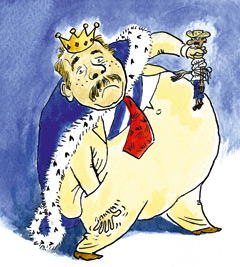Archive for February, 2009
“Political tension in Nicaragua: The new Somoza”
The following is a concise article on the current worsening situation in Nicaragua:
Feb 19th 2009 | MANAGUA, From The Economist print edition
Daniel Ortega’s slide to autocracy

LATER this year Daniel Ortega will celebrate the 30th anniversary of the revolution that toppled the notorious American-backed dictatorship of the Somoza family and brought his left-wing Sandinista movement to power. Though Mr Ortega is once again president, as he was in the 1980s, in other ways Nicaraguan politics have changed radically. Most of his fellow revolutionary
leaders have left the Sandinista Party and are now in opposition. And Mr. Ortega is well on the way to establishing an autocracy, albeit a bankrupt one, in cahoots with former somocistas.
The latest step came last month when the Sandinista-controlled Supreme Court quashed a 20-year sentence for embezzlement against Arnoldo Alemán, a former president (and once an official in the Somoza dictatorship). Several years ago Mr Alemán forged an unacknowledged alliance of convenience with Mr. Ortega, which Nicaraguans call “the pact”. This wavered when Mr Ortega ignored the opposition’s complaints that a pliant electoral authority allowed the Sandinistas to steal municipal elections in November, which independent observers were banned from scrutinising. But hours after Mr Alemán’s absolution his Liberal Constitutional Party ended a filibuster in the National Assembly and voted to let the Sandinistas run the legislature’s affairs.
The next step, opponents fear, will be to get the assembly to vote for a constitutional reform that would allow Mr Ortega, like his friend Hugo Chávez in Venezuela (see article), to stand for re-election. Or it might involve adopting a semi-parliamentary system in which Mr Alemán would run for president but Mr Ortega would cling to power as prime minister.
The result of November’s municipal elections, in which the Sandinistas claimed to have won Managua, the capital, have still not been published. That has not stopped Mr Ortega from holding a floodlit ceremony to acclaim the new mayors. But if Nicaraguans have had to swallow the results, foreigners have not. The United States and the European Union have suspended much of their aid (some $200m between them) pending an electoral review. Since there is no sign of that, “There is a real risk that the [aid] programme will be withdrawn,” a European spokesman says.
Until recently Mr Ortega could scoff at these threats, since he enjoyed the largesse of Mr Chávez. But the fall in the oil price means that this is drying up. Nicaragua is one of the poorest countries in the Americas. The budget, already cut by 4% compared with last year, is “unsustainable”, according to Bayardo Arce, a Sandinista leader. Capital is fleeing and remittances are falling. Mr Ortega is looking to Russia for support. (Nicaragua is the only country other than Russia to grant diplomatic recognition to South Ossetia, an enclave carved out of Georgia.)
Already unpopular, Mr Ortega seems to have miscalculated in alienating aid donors. Since the municipal election he has deployed gangs of uniformed thugs to break up opposition protests. So far they are armed only with staves, stones and homemade mortars. His regime is starting to resemble the dictatorship he once helped to overthrow. One of the original Sandinista leaders now in opposition says he feels obliged to meet contacts in secret, “as we used to do under Somoza”.
Pearl Friedberg
LAC Program Associate
Illustration by Claudio Munoz